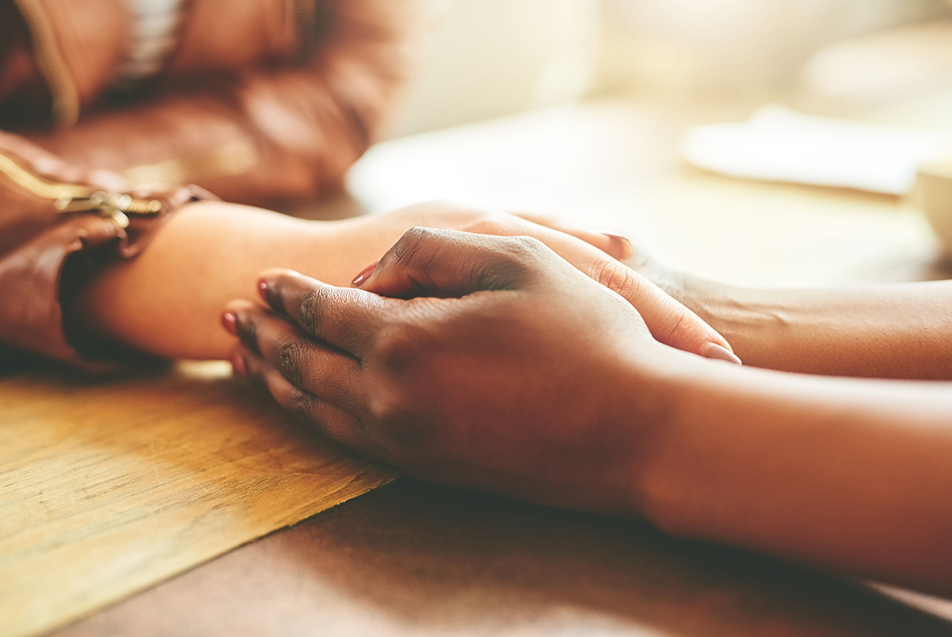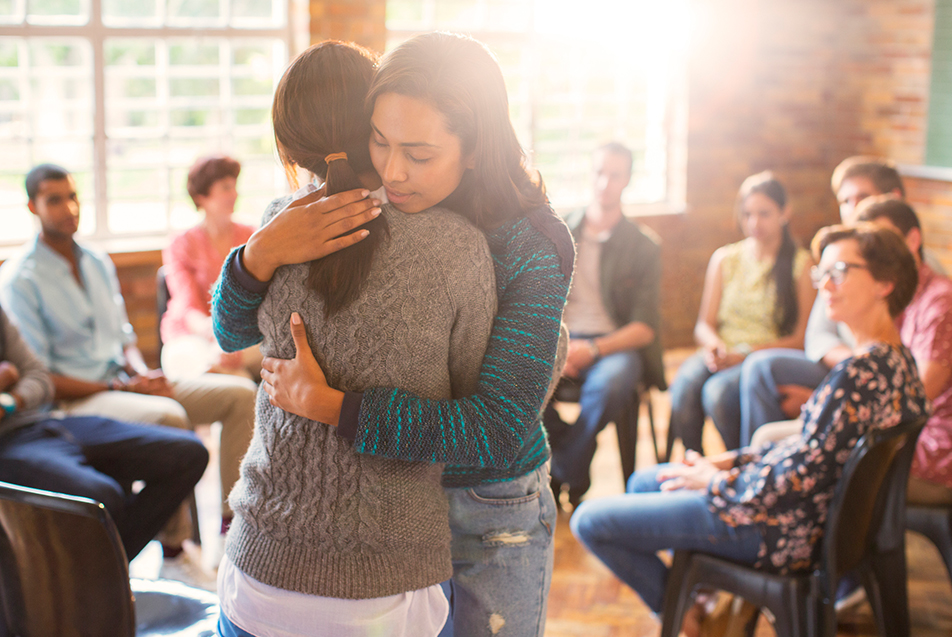
Parkview Health offers support for those in need of end of life care, from hospice for the patient, to grief counseling for their loved ones. Cathy Petrie, LCSW, hospice bereavement counselor, and Michael De Winter, MSW, LSW, hospice bereavement counselor/social worker, share more about these special services, and invite the wife of a former hospice patient to share a bit about her experience.
Define “bereavement”
Cathy: The support group book we use is "Understanding Your Grief" by Dr. Alan Wolfelt. His definition of bereavement is, "to be torn apart", "to have special needs", "to be robbed".
Michael: Bereavement is defined by a period of grief and mourning following the death of a loved one and can include the full range of human emotions.
What does the Parkview bereavement program provide?
Cathy: Caregivers receive bereavement support as their loved one declines. Hospice staff and home healthcare staff provide anticipatory grief discussions, education and support as the illness progresses, so that families are supported before the patient passes away.
Michael: The program includes follow-up visits, phone calls, counseling (if desired), a quarterly newsletter and other mailings, memorial services and support groups.
When would patients and loved ones receive these services?
Michael: Typically, a family has a loved one on service with hospice, and so those loved ones are automatically transferred to the bereavement program following the death of the patient. Sometimes, however, members of the community will call and request information on support for losses they are experiencing as well. We typically open up our counseling and support groups to the broader community if we feel we can serve them appropriately.
Who is on the bereavement services team?
Michael: At Parkview, all of our bereavement workers have at least a master’s degree, in either social work or chaplaincy/divinity and, as such, have received training in professional counseling. We also have a dedicated group of volunteers who assist us with making sure the various mailings get out on time. Volunteers also provide vital assistance during our memorial services.
Why are these services so beneficial for loved ones?
Michael: I think the bereavement services are beneficial in so many ways, and it is different for each person. Grief is very much a process, and no two people will experience it in exactly the same way. I think for many people it’s a comfort just to know that this kind of support is available to them if they ever need it. Many times, people just need to know that the strong emotions they’re experiencing are “normal” and that they’re not going crazy. Other times, however, support for a griever can mean many counseling sessions over a period of months to help them process other issues that may be getting in the way of their grieving.
How can people get involved with the support groups?
Cathy: In support groups, members appreciate hearing each other’s stories. Someone may put into words something that another person cannot find the words to say. One member may share how they are coping and others will take that idea and transform it into something they can use. Members may cry freely with support. Some people remain friends for years following the group.
The group provides a book "Understanding Your Grief" by Dr. Alan Wolfelt as a gift from the Parkview Foundation. The book outlines ten touchstones that guide members as they live in their time of grief.
Parkview Hospice at Noble offers four groups a year. Tuesdays at LaGrange First Presbyterian Church, 200 W. Michigan St., LaGrange, IN, 46761, and Thursdays in Noble county at the Kendallville Public Library, 221 S. Park Ave., Kendallville, IN, 46755, for ten week sessions January - March and September - November.
Michael: I am currently working with Chaplaincy to establish an ongoing, monthly bereavement support group. More details on this group will be available in early 2019.
Where can people go to learn more?
Michael: People can call Parkview Home Health & Hospice at (260) 373-9800 for more information on bereavement support services.
Cathy: People wanting services in Noble, LaGrange, Steuben, or DeKalb counties can call 1-800-292-9894 to enroll in a group or meet with a bereavement counselor.

Blessings through bereavement
Kris Reade’s husband, John “Mike” Reade, was diagnosed with Medullary thyroid cancer, a very rare form of the disease, in 2003. He endured a number of surgeries and treatments. When it became available, Mike was one of the first patients to receive chemotherapy for his specific form of cancer.
Unfortunately, the treatment was very hard on him. “The chemo was taking him down faster than the ancer,” Kris recalled. “He was so weak. The doctors told us it was a hospice situation. Of course, we were so scared when we heard that.” But as the Reade family would discover, blessings come in unexpected packages. “As my daughter described it, when Fran, Mike’s hospice nurse, walked in, we got an angel from heaven.”
This initial meeting would be the beginning of a 2 ½ year partnership between the hospice care team and the Reades. “It was like we finally had help. They were lifting such a burden off our shoulders. My husband didn’t want to quit, but he was ready. The fact that he got to come home and be happy and comfortable was such a gift. We thought agreeing to hospice would mean we were giving up, but we were so wrong. It was the start of an amazing adventure, filled with so many rewarding memories and stories.”
The benefits, the family found, extended far beyond their expectations. “They’d given Mike 2-4 years to live initially, and he lived 14 years. We were financially strained from insurance and medical costs. Hospice came in and took over. They were able to help us with his equipment and medicines.
And they were so organized! When we got home from the hospital, they’d brought the bed, commode, oxygen tanks, shower chair, everything he’d need. It was all here and ready to go,” Kris said.
While the couple’s three daughters, one of whom is a nurse, were incredibly helpful, Fran and the hospice team helped the family facilitate some of the trickier aspects of Mike’s care. “Fran would come twice a week, but we could call or text her if we needed help. She’d check dressings, take his vitals, ask him questions, talk with him. Our goal was to keep him as alert as possible, but also comfortable. She worked and worked with this amazing pharmacist. Since he couldn’t swallow, they came up with liquid medications that would work for him. They didn’t give up until they found a solution.
The biggest thing was, we know his last 2 1/2 years were OK. She made it all OK. It’s not that we gave up, we just realized that it’s OK to be prepared. To stop fighting to make him better only to live in pain. With Fran, we found a way to help him be happy and comfortable in his last months, rather than have him miserable for more months.”
For other families facing hospice care, Kris hopes that their time is as rich as hers was with Mike. “He’d look out the window at the lake and enjoy every day. Death is a weird phenomenon, but it was also beautiful. We had enough time for hospice to really be able to help us, and that makes me feel lucky.”
Mike passed away on March 5, 2017. “Everybody’s going to die,” Kris said, “but spending the last days of his life like we did, made us closer as a family. We had peace.
I thank God for hospice, and for Fran. She was an angel, and became part of our family. She was angel – kind-hearted, efficient, and just a great nurse.”
Kris and Mike also developed a strong relationship with the hospice chaplain, Rev. Kenneth Weaver, LCSW, LCAC. “They’d talk for hours, and Mike really looked forward to going to heaven. Before Mike’s funeral, Ken had a special service for my grandchildren, in a separate room. The kindness and support he showed the kids that day was over the top. He took it off of our shoulders.”
Later, Kris also attended the grief counseling in Kendallville with Cathy (featured above) and Ken. “It made me realize I wasn’t alone, and that It’s OK to grieve in my own way. The main thing was, we had to realize their death was final. We have to find our new identity. We’re all struggling in different ways, but we can connect with others experiencing something similar.”
In the end, Kris looks back on her time with Mike, and their extended hospice family, as a true gift. “Most people don’t have enough time to realize what an amazing group hospice is. It was an honor to be served by their team. I feel blessed.”



